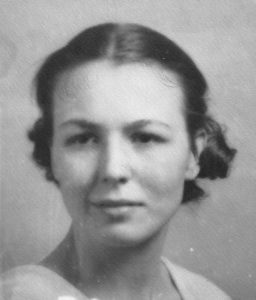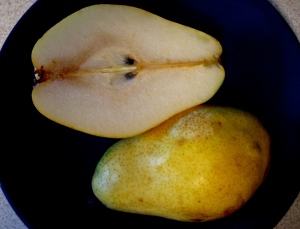
My Aunt Virginia, who died in 2012, left me her important papers, a partially written memoir, letters, jottings, and diary entries, which she had severely edited by slicing them out of her journals with a sharp knife, leaving behind only what she wanted posterity to see.
During our recent move to Virginia I came across the box where I had stored her stuff since her death and decided it was time to sort through it. What I found has been a treasure trove of family history, as well as an introduction to a complicated, fiercely intelligent, strikingly independent and delightful young woman.
I knew Virginia intimately my whole life as my aunt, my Godmother, and my spiritual mother, but as I poured over what she chose to leave behind I learned what she had never shared; her deepest struggles to figure out life, to live and love to the fullest, to use and be respected for her intellect. She was determined to not just do what was expected, to marry the first appropriate guy that came along with a decent job. She wanted true love, a soulmate, and she stuck to her guns about it, taking a unique stance for a young woman growing up in the 1920s and 30s, delaying marriage until it was right, in spite of the many attempts to marry her off.
She did meet her true soulmate when she was 30, a vibrant, brilliant young graphic designer who was making a name for himself in the New York graphic design world of 1950. It was a love affair that swept them both off their feet and into a whirlwind of intense love, emotion, and deep spiritual connection. He proposed to her on the first night they met and she accepted, though she was inclined to take things a bit slower than he. It turned out he was right to want to speed things up because it all ended tragically when he died suddenly and unexpectedly two months after they met, on the operating table during an emergency appendectomy of an allergic reaction to an anesthetic.
His death left her desolate, but it didn’t stop her; she sought to recapture that love and intense connection in another, and another. She gained insight and wisdom the hard way, by living and learning, by looking deep into her yearning heart and by using her keen mind. She once said, “It seems that you just keep on and that’s not even so bad, so long as you keep struggling!” The “struggle” she refers to is the soul’s yearning for something that only the heart will recognize when it finally comes around.
Virginia was born in 1919 and lived through the Roaring Twenties, the Great Depression, and World War II. She lived most of her life in New York City, though she loved the countryside. When she was growing up the family always had a house elsewhere to venture to on weekends and during the summer months, a shack on the beach at Rocky Point, a farmhouse in Orange county, and later a permanent home in Dutchess County.
She held various positions in publishing, having worked at Harper’s Magazine, McGraw-Hill and the World Press Review. She was active in international relations during World War II, working at the Committee to Defend America by Aiding the Allies (CDAAA), The United Nations Association, and for Professor and Legal Scholar Clyde Eagleton at NYU’s Graduate School of International Affairs during the founding of the United Nations.
Virginia was an insatiable reader, her library was vast and all-encompassing. She found something of interest in every book she ever read and every person she ever met. A prolific letter writer, she maintained lifelong friendships with several international pen pals, from her teen years until her death, or theirs, many of whom she never met in person. And, always, she aspired to being a “real” writer, like many of the great writers she met during her years in publishing.
Recently, Chuck wrote a blog that included insight into one of our most intriguing human psychological traits, one that we all innately possess, that of projection, and the power we have within us to use the mirror of self-reflection to achieve a higher state of self-realization, especially by confronting our feelings of self-importance.
He wrote: We begin by assuming responsibility for the fact that we, as individuals, reflect the reality we see without. Although it may be difficult to face this shadow truth, it is also quite empowering. You can read the whole blog here.
Among my aunt’s papers I found more than a few pieces that directly confronted her own struggles with this most common trait, the power of projection in the search for a soulmate. As Chuck wrote in Soulmate 101: At the psychological, or spiritual dimension, the soul mediates our spirit’s longing for itself in matter. The root of desire is this attractive force of spirit seeking appropriate matter to realize itself, or to manifest as a physical reality. To accomplish this, soul uses the psychological mechanism of projection.
Virginia was a jazz aficionado. As she wrote when she went to her first jazz concert at Town Hall in 1942: “I was struck dumb. I felt exactly as though I had been slugged with a baseball bat… I had come home. This was the music I had longed for, without knowing it. I knew it at once, though.” After that she could not get enough of jazz. She went to as many concerts as she could, read as many books on the subject as she could find, scoured the record stores for albums, learning as much as she could about this new music that was, as she wrote, “something to believe in.”
The following example of soulmate projection and reconciliation was written when Virginia was 38. She was facing the end of one soulmate projection and was soon to meet another soulmate, her husband-to-be, Max Kaminsky. Max was a well known jazz trumpeter and cornetist and she had been one of his biggest fans, meeting him shortly after that first concert she went to in 1942. They lost contact for many years then met again when she was 39 and he was 50. Eventually, they married and wrote My Life in Jazz together, a memoir of his long career as a jazz musician. Their marriage was intense and loving, and it lasted until Max’s death in 1994, the day before his 86th birthday. Here is Virginia’s reflection:
August 9, 1957
“Dad was talking tonight about how much the old-time performers gave of themselves—and it suddenly struck me—more forcibly than ever before in my life—how little I give of myself.
This is one of my worst blocks—I noticed it in myself in the car tonight with the two women [whom she frequently rode from the city with on weekends to visit the family farm in Dutchess County]—all they really want is pleasantness. I used to be so touchy, thinking that if I gave of myself they would have a power over me—is that it— or was it that I expected so much of them that when they misunderstood I became hurt, disappointed and offended.
But it’s a prison—one I’ve made all by myself. I’m a secretary because I act like one—goddammit—a stuffed shirt. What I have to get thru my thick head is that I am free-free-free, just as free as I choose to be and that it’s not those “other” people who are holding me back—it’s me.
I don’t have to believe in the role Jacques [the man she was in love with at the time] has assigned to me. I am perfectly free to love him if I choose—and in that way it’s none of his business—as long as I don’t, overtly or insidiously, ask for his love in return. That’s the counter, [the] balance—you are free just so long and in proportion to how little you try to exact from others.”
In this piece, my aunt reflects beautifully on herself, coming to a deeper realization that she is responsible for how she feels and views the world. In her analysis, she fully owns her own part in the unfolding of her life, deciding that she can choose as she pleases, as long as she doesn’t take what is not freely given, even energetically.
Here she breaks the mirror of her own self-reflection, withdrawing her projection and owning her own inner soulmate, preparing to live it in her physical life. In fact, it was a pivotal moment; without her even knowing it, she was preparing to enter a new reality, opening the way for further true self-realization. And as we know, she did meet her true soulmate, Max, shortly after this, perhaps because she was finally ready.
At the time, she held a limiting belief about herself, that she was only a secretary. Shortly after this, her papers reveal, she decided to give more of herself and volunteered to read to the blind. She ended up as a volunteer reader for many years, reading to law students, to college and high school students, when called upon. But the actual truth is that she grew far beyond the secretary self that she so bemoaned, eventually becoming the senior editor at Harper’s Magazine. I used to see her name on the masthead, third one down from the top, after the editor-in-chief and the managing editor. And she did become the writer she had always yearned to be.
Having opened the box containing my aunt’s things and discovering what she valued and chose to pass on, I too ask myself, do I give enough? Do I do enough? Am I kind enough?
Do any of us give enough? Are any of us kind enough? How much do we hold ourselves back because of our limiting beliefs, because of our entrenched defenses, our sense of entitlement, our regrets or resentments? Why are we so offended all the time?
I thank my aunt for the little bits she left behind, modest and humble in their number yet full of profound insight into a woman’s struggle to find her place in the world, and to matter.
In remembrance of a wise woman,
Jan



